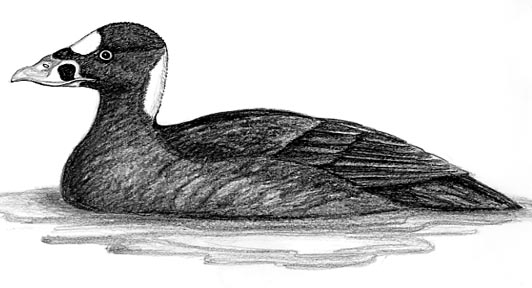
Dear Bird Folks,
You have to help me. I’m trying to find out if there is a bird called a “skunk-head.” I’m reading a novel and the lead character occasionally goes out hunting for skunk-heads. I assume that he is hunting some kind of bird, perhaps a duck, but I can’t find any skunk-heads in my bird book. Is a skunk-head a bird and if so, why would anyone want to eat one?
-Colleen, Middlebury, VT
Come on Colleen,
You mean to tell me that you wouldn’t want to eat a nice skunk head? What are you some kind of gourmet food snob? Does everything have to be made out of cheddar cheese for you VT people? How about syrup? I’d bet if the skunk head was covered in maple syrup you’d eat it. You know you would. You are correct in both of your assumptions Colleen. Skunk-head is the folk name of a Surf Scoter, which is a duck, and in one of nature’s oddest coincidences, this duck also happens to be a bird. The odd nickname has nothing to do with the odor of the duck. The name comes from the black and white pattern on the bird’s head. Surf Scoters are sea ducks which have a totally black bodies, with striking white patches on the back and front of their heads, helping both birders and hunters with long distance identification.
As this duck’s less offensive common name implies, Surf Scoters are birds that can be found in ocean surf. You won’t find Surf Scoters in tranquil country ponds or in southern backwater swamps. Scoters avoid swamps for two reasons. They don’t provide the types of food these birds require and swaps have snakes, big creepy snakes. (Although I may be projecting about that snake thing.) Also, while we are talking about this bird’s name, keep in mind scoter is pronounced with a long “O” sound, as in motor. That might sound obvious to some, but I often have people tell me that they’ve seen a flock of “scooters” fly past their beach house. Flying scooters eh? Must have been at cocktail hour.
Birders have to locate Surf Scoters visually, because you aren’t going to hear them. A while ago we talked about the noisy Long-tailed Duck, a sea duck that rarely ever shuts up. Surf Scoters are just the opposite; they never speak. They are virtually silent all year except for a few grunts and gurgling sounds they make during courtship. But hey, who doesn’t do that? When it comes to dietary choices these birds are muscle eaters. They forage by diving down to submerged rocks and stripping off muscles and other shellfish. They favor small shellfish which they swallow whole. Favoring shellfish is a bit of an understatement. One scoter was found with over 1,000 muscles and clams crammed into its stomach. And that’s not counting the linguini or the clam sauce.
Surf Scoters aren’t particularly deep divers, thus they are often found close to shore. Watching them feed can be entertaining in itself. Surf Scoters participate in synchronized diving. When one bird goes under, the entire flock goes under. The reasons for diving in unison aren’t perfectly clear but one theory is that by diving together they are able to surface together, making it hard for food stealing gulls to single out a lone bird. Another theory is that no bird wants to be left alone at the surface in case a snake happens to swim by, but I may be projecting again.
North America has three species of scoters and all three can be found along either coast. However, the Surf Scoter is the only scoter that is confined to our continent. They are rarely found in Europe unless they are lost or on a bus tour. The other two scoters are the White-winged Scoter, which is named for the white on its wing (Clever, eh?) and the Black Scoter, which is named for having all the same colored plumage, which I’m pretty sure is black.
Surf Scoters nest way up in Canada, so the best time for us to see them is during the fall and winter. Rafts of hundreds of scoters may be found off coastal beaches. On Cape Cod they can be found at many locations including the mouth of the canal, Nauset Beach in Orleans and Race Point in Provincetown.
If you want to see some skunk-heads Colleen you are going to have to leave your mountain home in VT and come visit us here on the coast. Keep in mind, like the book you are reading mentioned, scoters are a bird that is hunted. You may encounter hunters while looking for scoters, but that shouldn’t be a problem, unless you happen to be a lawyer and one of the hunters happens to be Dick Cheney.